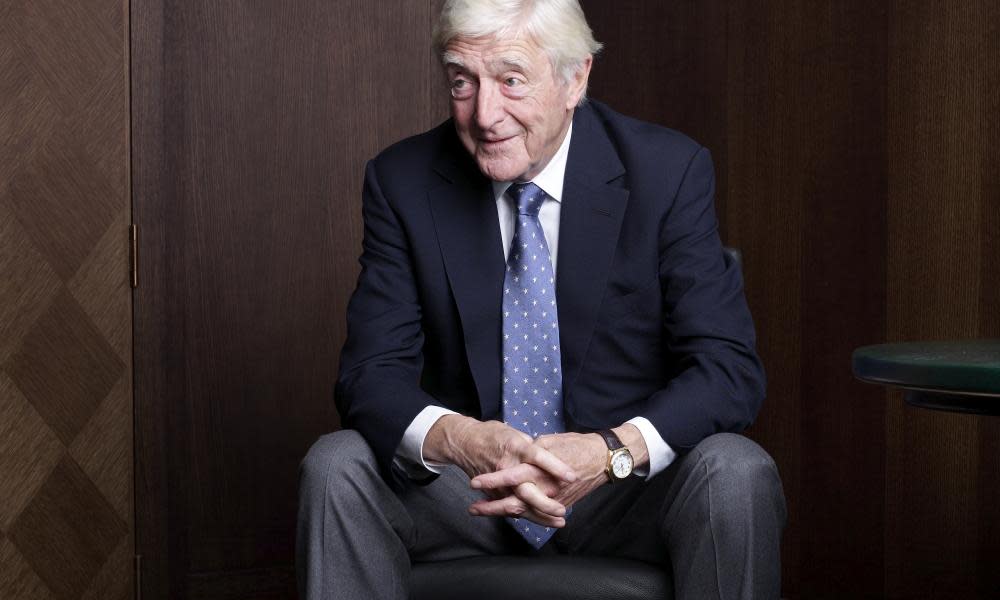In an age of shallow celebrity interviews, a tribute to Michael Parkinson – master of the form

There often comes a point in the life of a celebrity interviewer when they become as famous as their subjects and switch sides. James Corden, Ellen DeGeneres, Jimmy Fallon, Jonathan Ross, Oprah: on joining the celebrity classes, all lost the ability to grill their subjects, instead treating them much as they would dinner party guests.
It never happened to Michael Parkinson, who has died aged 88 and who dominated British chatshows for 40 years. “Parky” was undoubtedly famous but, as he was fond of pointing out, he saw himself as a journalist rather than a presenter. As such, he knew his job wasn’t to ingratiate himself and become best pals with his guests. And what guests they were: Lauren Bacall, John and Yoko, Muhammad Ali, Fred Astaire, John Wayne, Orson Welles, Shirley MacLaine, Bette Midler, James Stewart, George Best, Peter Sellers.
Tommy Cooper rendered him helpless with laughter, as did Kermit and Miss Piggy; through force of her beauty, Raquel Welch just rendered him helpless. Parkinson, a miner’s son who reckoned to have interviewed 2,000 celebrities by the time he retired, represented a TV era in which the celebrity interview wasn’t merely a promotional opportunity but a chance to get to know the person behind the glitz.
Much has changed since then, in TV and in the world of celebrity. Famous people are now more likely to hone their public image through their social media accounts rather than TV appearances. The power has shifted: celebrities don’t need talkshows any more, even though talkshows need celebrities. Now, to sit on a chatshow sofa is to get dressed up, trot out a set of rehearsed, meme-able anecdotes, namecheck the latest album/movie/TV series and go home.
And the interviewer? Their job is to be warm, funny, cheeky (but not too cheeky), to appear spontaneous while sticking to the script. This, in fairness, is a skill itself, one perfected by Graham Norton, who manages to keep his interviewees onside while never appearing awed by them. But the fact remains that the celebrity interview has become stuck in its ways: the false bonhomie, the rictus grins, the retina-scorching sets. On TV talkshows there can be no surprises, no great revelation, no attempt at meaningful conversation.
When it comes to in-depth conversations, audio has long been streets ahead of TV. That, 80 years on, Desert Island Discs on Radio 4 remains one of the network’s most popular series suggests an appetite for celebrity encounters that aren’t afraid to get serious. Podcasts have also heralded the return of the longform interview. While celebrity interview series, in which famous people interview their famous friends, are now ubiquitous and wildly variable in quality, they nonetheless show that lengthy conversations that aren’t simply about plugging a film are not the turn-off that commissioning editors think they are.
None of which is to say that the TV chatshows of the past were paragons of brilliance. For all his supposed gravitas, Parkinson had his off days, not least in refusing to take female performers as seriously as their male counterparts. Witness his excruciating interview with Helen Mirren in 1975, when he used air-quotes when calling her a “serious actress” and asked if she was hindered in her career by her “equipment”, by which he meant her breasts. Addressing the interview in 2019, he said: “I feel it’s of its time, and of its time it’s embarrassing. It was over the top, absolutely so.” But what the interviewers of the past got was the time and space to dig deep and challenge their guests.
Related: Sir Michael Parkinson obituary
There are signs that things are changing. Last year BBC Two screened Louis Theroux Interviews …, a TV series modelled on Theroux’s hit podcast in which he met Judi Dench, Stormzy, Katherine Ryan and others in their homes and asked them serious and searching questions. After retiring from his talkshow, the veteran US host David Letterman went straight to Netflix, where he made My Next Guest Needs No Introduction, an interview series where he talked to, among others, Billie Eilish, George Clooney and Barack Obama in their homes at 45 minutes a piece.
It would be nice to think that celebrity interviews will continue moving in this direction with shows that value meaty conversation over PR-mediated small talk. While no one is demanding that every encounter be an epic power struggle, a modern-day Frost meets Nixon, some insight and depth would be a start. As Parkinson demonstrated, a successful interview is when the subject submits to the process, drops the showbiz facade and, in having an honest conversation, shows us who they really are.
Fiona Sturges is an arts writer specialising in books, music, podcasting and TV
Do you have an opinion on the issues raised in this article? If you would like to submit a response of up to 300 words by email to be considered for publication in our letters section, please click here.

 Yahoo News
Yahoo News 
